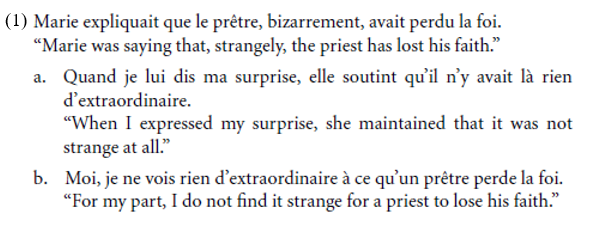


 Grammar
Grammar
 Tenses
Tenses
 Present
Present
 Past
Past
 Future
Future
 Parts Of Speech
Parts Of Speech
 Nouns
Nouns
 Verbs
Verbs
 Adverbs
Adverbs
 Adjectives
Adjectives
 Pronouns
Pronouns
 Pre Position
Pre Position
 Preposition by function
Preposition by function 
 Preposition by construction
Preposition by construction
 Conjunctions
Conjunctions
 Interjections
Interjections
 Grammar Rules
Grammar Rules
 Linguistics
Linguistics
 Semantics
Semantics
 Pragmatics
Pragmatics
 Reading Comprehension
Reading Comprehension
 Teaching Methods
Teaching Methods|
Read More
Date: 28-2-2022
Date: 2024-01-11
Date: 2024-01-20
|
On embedded evaluatives
Up to now we have assumed that the speaker was responsible for the judgment associated with the evaluative adverb. This is a simplification: although it is by far the most frequent situation, it is not always the case. Whether or not an agent other than the speaker can take charge of conventional implicatures has been the object of some debate. Whatever is the case for the (other) conventional implicatures, the data for evaluatives is clear. There are contexts where the speaker attributes the judgment to another agent; the clearest case is that of speech reports.
Consider sentence (1). Both (1a) and (1b) are possible continuations. Yet the agent responsible for the evaluative is the speaker in (1a), and Marie in (1b).

Potts (2005: 116–117) dismisses such examples as hidden cases of direct quotation. While this might be the correct analysis in some cases, this cannot be true for sentences like (2). Note that the evaluative phrase contains the indexical moi ‘me,’ which unambiguously refers to the speaker, and not Marie. Thus the evaluative phrase cannot be part of a direct quotation of Marie’s speech.

Thus, like most researchers (Bach 1999; Geuder 2000; Jayez and Rossari 2004) but contra Potts (2005), we accept that the agent responsible for the evaluative may be different from the speaker. Accordingly, an adequate analysis must not presuppose that evaluatives are strictly speaker-oriented. Although we do not provide an explicit account of examples like (2) here for lack of space, we note that an appropriate analysis can be provided by assuming that speech report verbs give rise to the same type of semantic representations as full utterances, including a representation of the dialogue gameboard of the agent whose speech is reported, where the evaluative can be scoped appropriately. Bonami and Godard (2007b) makes such an analysis explicit within an HPSG grammar.
|
|
|
|
حقن الذهب في العين.. تقنية جديدة للحفاظ على البصر ؟!
|
|
|
|
|
|
|
علي بابا تطلق نماذج "Qwen" الجديدة في أحدث اختراق صيني لمجال الذكاء الاصطناعي مفتوح المصدر
|
|
|
|
|
|
|
مشاتل الكفيل تنتج أنواعًا مختلفة من النباتات المحلية والمستوردة وتواصل دعمها للمجتمع
|
|
|